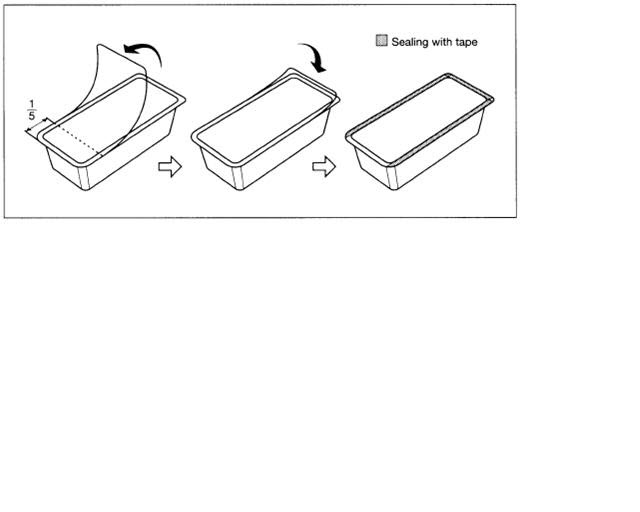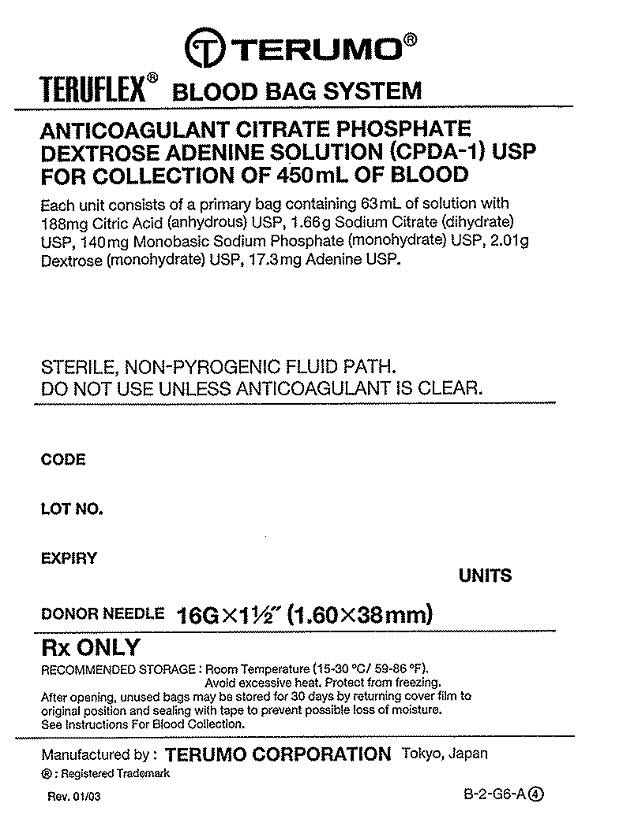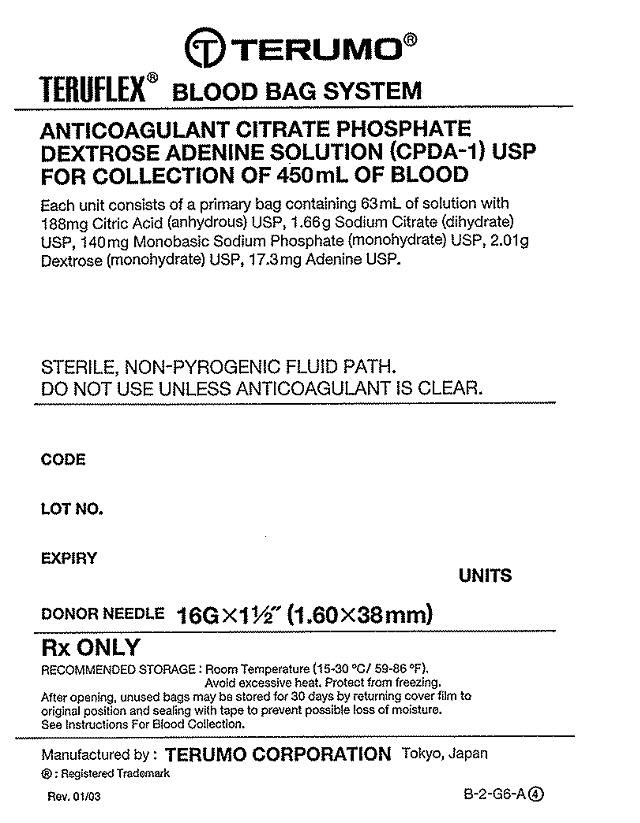Label: TERUFLEX BLOOD BAG SYSTEM ANTICOAGULANT CITRATE PHOSPHATE DEXTROSE ADENINE (CPDA-1) (anticoagulant citrate phosphate dextrose adenine- cpda-1 solution
- NDC Code(s): 53877-001-02, 53877-001-03
- Packager: Terumo Corporation
- Category: HUMAN PRESCRIPTION DRUG LABEL
- DEA Schedule: None
- Marketing Status: New Drug Application
Drug Label Information
Updated December 7, 2018
If you are a consumer or patient please visit this version.
- Download DRUG LABEL INFO: PDF XML
- Official Label (Printer Friendly)
-
INDICATIONS & USAGE
Revised 2011-11
N-BB-CA-A 5
BB89X505+5
FULL PRESCRIBING INFORMATION
*Sections or subsections omitted from the Full Prescribing Information are not listed [includes sections 4, 6, 7, 8, 9, 10, 12, 13, 14, 15 and 17].
1. INDICATIONS AND USAGE
1.1. Read these instructions carefully before use.
1.2. Rx ONLY
1.3. Intended for the collection, processing and preservation of Whole Blood and blood components. Not intended for direct intravenous infusion.
1.4. For the collection of 450 mL +/- 10% Whole Blood.
1.5. For further processing, use standard component processing techniques. -
DOSAGE & ADMINISTRATION
2. DOSAGE AND ADMINISTRATION
2.1. To open blister package, peel cover film back 4/5 of its length.
2.2. Prepare the blood bag following your institution's standard operating procedures.
2.3. Make a loose knot in the donor tubing approximately 10 cm or 4 inches from the needle unless alternate methods are used to seal the tubing at the end of collection.
2.4. Temporarily clamp donor tubing.
2.5. Suspend the collection bag as far as possible below the donor's arm.
2.6. Apply blood pressure cuff or tourniquet to donor's arm. Disinfect site of phlebotomy. If blood pressure cuff is used, inflate to approximately 60 mmHg.
2.7. Remove needle cover and perform phlebotomy.
2.7.1. CAUTION: Do not touch the needle after removing the needle cover.
2.8. Remove the temporary clamp on the donor tubing to permit blood flow into the collection bag.
2.9. Secure donor tubing to donor's arm.
2.10. Mix blood with anticoagulant in the collection bag and continue to mix at several intervals during collection and immediately after collection. If using an automated mixer, follow manufacturer's instructions.
2.11. Collect labeled volume of blood 450 mL (+/- 10%).
2.12. When the desired amount of blood has been collected, seal the tubing or tighten the loose knot (white knot) prepared in Step 2.3. Temporarily clamp between the knot and needle. Sever donor tubing between knot and clamp. Alternate methods may be used to seal tubing. Collect blood samples using careful attention to aseptic technique and following your institution's standard operating procedures.
2.12.1. CAUTION: Do not use a dielectric tube sealer to seal the tubing while the needle is connected to the donor's body unless it is approved for such a purpose.
2.13. Reapply clamp to donor tubing; release pressure on donor's arm and remove needle. If using a needle safety device, follow manufacturer's instructions.
2.13.1. CAUTION: Discard phlebotomy needle/donor tubing according to institutional procedures.
2.14. Immediately after collection, invert collection bag several times to assure blood and anticoagulant are well mixed.
2.15. Strip blood from donor tubing into collection bag, mix well, and allow tubing to refill; repeat once. Make an appropriate number of segments of anticoagulated blood for testing by sealing on or near X marks. Leave segments attached to Whole Blood unit.
2.16. The time between Whole Blood collection and component separation may vary depending on both the blood bag system and processing options selected. Follow your institution's standard operating procedures to prepare components.
2.16.1. If the Whole Blood is to be processed into room temperature components, maintain the blood at ambient temperature.
2.16.2. If the Whole Blood is to be processed into other components (including Plasma Frozen Within 24 Hours After Phlebotomy), Whole Blood must either be placed in storage at a temperature between 1-6oC within 8 hours of blood collection or cooled towards a temperature between 1-10oC (e.g. during transport) and then placed in storage at a temperature between 1-6oC within 8 hours of blood collection or cooled towards a temperature between 1-10oC (e.g. during transport) and then placed in storage at a temperature between 1-6oC upon arrival at the processing center.
2.17. Platelet Rich Plasma and Platelets should be separated from the Red Blood Cells within 8 hours of blood collection, if prepared.
2.18. Plasma intended for production of Fresh Frozen Plasma should be separated from the Red Blood Cells and placed in a freezer at -18oC or colder within 8 hours of blood collection.
2.19. Plasma intended for production of Plasma Frozen Within 24 Hours After Phlebotomy (PF24) should be placed in a freezer at -18oC or colder within 24 hours of blood collection.
2.20. For further preparation and processing of other plasma components, use standard processing and storage techniques following approved regulations and standards.
2.21. Select the appropriate spin condition and centrifuge Whole Blood unit to separate CPDA-1 Red Blood Cells from plasma or platelet rich plasma, as appropriate.
2.22. Break the CLIKTIP (inline closure device) of primary collection bag and transfer plasma into satellite bag, or transfer platelet rich plasma into XT-612 Platelet Bag. Clamp transfer tubing of satellite bag.
2.23. Seal tubing of primary bag in two places, cut between seals, and if applicable, separate from satellite bag(s).
2.24. Store CPDA-1 Red Blood Cells (or Whole Blood) between 1-6oC for up to 35 days.
2.25. If prepared, store Platelets between 20-24oC for up to 5 days in XT-612 bag.
-
DOSAGE FORMS & STRENGTHS
3. DOSAGE FORMS AND STRENGTHS
3.1. 63 mL Citrate Phosphate Dextrose Adenine (CPDA-1) anticoagulant USP for collection of 450 mL Whole Blood. Each 63 mL contains 188 mg Citric Acid (anhydrous) USP, 1.66 g Sodium Citrate (dihydrate) USP, 140 mg Monobasic Sodium Phosphate (monohydrate) USP, 2.01 g Dextrose (monohydrate) USP and 17.3 mg Adenine USP.
-
WARNINGS AND PRECAUTIONS
5. WARNINGS AND PRECAUTIONS
5.1. Rx ONLY
5.2. Do not use unless solutions are clear and free from particulates.
5.3. Always inspect the blood bag set for leaks before use.
5.4. Avoid excessive heat and direct sunlight. Protect from freezing.
5.5. Recommended storage conditions: Room Temperature (15-30oC/59-86oF)
5.6. It is normal to have condensation in the blister packaging. If the amount of moisture is greater than expected, check for leaks from the fluid-filled components of the blood bag set.
5.7. Use aseptic techniques.
5.8. Do not use a dielectric tube sealer to seal the tubing while the needle is connected to the donor's body unless it is approved for such a purpose.
5.9. Do not touch needle after removing the needle cover.
5.10. Discard phlebotomy needle/donor tubing according to institutional procedures.
5.11. The AGELESS (oxygen absorber packet, Mitsubishi Gas Chemical) contained in this package absorbs oxygen and generates heat on removal. Do not open and handle it with care.
5.12. Dispose of the AGELESS packet with the blister tray.
5.13. Do not dispose the AGELESS packet with wastes containing volatile or flammable materials.
5.14. Due to possible exposure to infectious agents in the handling of blood, take adequate precautions at all times to prevent exposure to and transmission of such agents. Follow your institution's standard operating procedures.
-
DESCRIPTION
11. DESCRIPTION
11.1. This blood bag system includes a 16 gauge x 1 1/2 inch (1.60 x 38 mm) needle with needle cover and a 450 mL (nominal capacity 600 mL) primary collection bag containing 63 mL Citrate Phosphate Dextrose Adenine (CPDA-1) anticoagulant. The Double blood bag set has one integrally attached empty satellite bag (nominal capacity 400 mL). The Triple blood bag set has one integrally attached empty satellite bag (nominal capacity 400 mL) and one empty XT-612 5 day Platelet bag (nominal capacity 500 mL).
11.2. The blood bag collection set is made of PVC (polyvinyl chloride with DEHP plasticizer).
11.3. The blood bag has no components made of natural rubber latex.
11.4. Tubing internal diameter (ID) nominal 3.0 mm.
11.5. Tubing outer diameter (OD) nominal 4.4 mm.
11.6. Donor tubing line maximum 19 segments available.
-
HOW SUPPLIED
16. HOW SUPPLIED/STORAGE AND HANDLING
16.1. Single use only.
16.2. Sterile and non-pyrogenic fluid path. Sterilized by steam. Opacity of the blood bag system may be observed. This is due to moisture absorption during the sterilization process. This is normal and does not affect the solution quality or safety. The opacity will diminish gradually.
16.3. A Material Safety Data Sheet (MSDS) is not required for this product.
16.4. Recommended storage conditions: Room Temperature (15-30oC/59-86oF)
16.5. Avoid excessive heat and direct sunlight. Protect from freezing.
16.6. To open blister package, peel cover film back 4/5 of its length.

16.7. After opening the blister package unused blood bags may be stored at room temperature for 96 hours or they may be stored for 30 days by returning cover film to original position and sealing with tape to prevent possible evaporation of solutions.
16.8. Blood bags in the unopened blister package may be used through the last day of the month and year as indicated on the original manufacturer's packaging.
16.9. The AGELESS packet contained in this package absorbs oxygen and generates heat on removal. Do not open and handle it with care.
16.10. Dispose of the AGELESS packet with the blister tray.
16.11. Do not dispose the AGELESS packet with wastes containing volatile or flammable materials.
16.12. For the Single blood bag set, Code BB*SCD456A, is supplied 60/case.
16.13. For the Double blood bag set, BB*DCD456A, is supplied 30/case.
16.14. For the Triple blood bag set, BB*TCD456A is supplied 30/case.
MANUFACTURED BY: TERUMO CORPORATION
44-1, 2-CHOME, HATAGAYA, SHIBUYA-KU, TOKYO, 151-0072, JAPAN
MADE IN JAPAN
®: Registered Trademark
(c) TERUMO CORPORATION November, 2011 11K08
AGELESS is a registered trademark of MITSUBISHI GAS CHEMICAL CO., INC.
-
PRINCIPAL DISPLAY PANEL
Tray/Case Label
TERUFLEX® BLOOD BAG SYSTEM
ANTICOAGULANT CITRATE PHOSPHATE
DEXTROSE ADENINE SOLUTION (CPDA-1) USP
FOR COLLECTION OF 450mL OF BLOOD
Each unit consists of a primary bag containing 63 mL of solution with
188 mg Citric Acid (anhydrous) USP, 1.66 g Sodium Citrate (dihydrate)
USP, 140 mg Monobasic Sodium Phosphate (monohydrate) USP, 2.01 g
Dextrose (monohydrate) USP, 17.3 mg Adenine USP.
STERILE, NON-PYROGENIC FLUID PATH.
DO NOT USE UNLESS ANTICOAGULANT IS CLEAR
CODE
LOT NO.
EXPIRY
UNITS
DONOR NEEDLE 16G x 1 1/2˝ (1.60 x 38mm)
Rx ONLY
RECOMMENDED STORAGE: Room Temperature (15-30°C/59-86°F).
Avoid excessive heat. Protect from freezing.
After opening, unused bags may be stored for 30 days by returning cover film to
original position and sealing with tape to prevent possible loss of moisture.
See Instructions For Blood Collection.
Manufactured by : TERUMO CORPORATION Tokyo, Japan
® : Registered Trademark
Rev. 01/03
-
INGREDIENTS AND APPEARANCE
TERUFLEX BLOOD BAG SYSTEM ANTICOAGULANT CITRATE PHOSPHATE DEXTROSE ADENINE (CPDA-1)
anticoagulant citrate phosphate dextrose adenine (cpda-1) solutionProduct Information Product Type HUMAN PRESCRIPTION DRUG Item Code (Source) NDC:53877-001 Route of Administration INTRAVENOUS Active Ingredient/Active Moiety Ingredient Name Basis of Strength Strength Anhydrous Citric Acid (UNII: XF417D3PSL) (Anhydrous Citric Acid - UNII:XF417D3PSL) Anhydrous Citric Acid 2.99 g in 1000 mL Trisodium Citrate Dihydrate (UNII: B22547B95K) (Anhydrous Citric Acid - UNII:XF417D3PSL) Anhydrous Citric Acid 26.3 g in 1000 mL SODIUM PHOSPHATE, MONOBASIC, MONOHYDRATE (UNII: 593YOG76RN) (PHOSPHATE ION - UNII:NK08V8K8HR) SODIUM PHOSPHATE, MONOBASIC, MONOHYDRATE 2.22 g in 1000 mL Dextrose Monohydrate (UNII: LX22YL083G) (ANHYDROUS DEXTROSE - UNII:5SL0G7R0OK) Dextrose Monohydrate 31.9 g in 1000 mL Adenine (UNII: JAC85A2161) (Adenine - UNII:JAC85A2161) Adenine 0.275 g in 1000 mL Inactive Ingredients Ingredient Name Strength Water (UNII: 059QF0KO0R) Packaging # Item Code Package Description Marketing Start Date Marketing End Date 1 NDC:53877-001-03 60 in 1 CASE 1 63 mL in 1 BAG; Type 9: Other Type of Part 3 Combination Product (e.g., Drug/Device/Biological Product) 2 NDC:53877-001-02 30 in 1 CASE 2 63 mL in 1 BAG; Type 9: Other Type of Part 3 Combination Product (e.g., Drug/Device/Biological Product) Marketing Information Marketing Category Application Number or Monograph Citation Marketing Start Date Marketing End Date NDA BN820528 12/10/2009 Labeler - Terumo Corporation (690543319) Establishment Name Address ID/FEI Business Operations Terumo Corp. - Fujinomiya Factory 695214015 manufacture(53877-001) , PACK(53877-001) , STERILIZE(53877-001) , ANALYSIS(53877-001)

